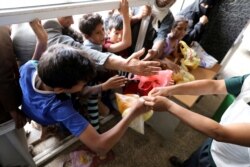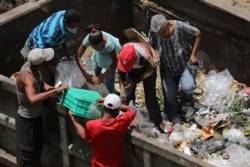New research by the Norwegian Refugee Council finds the economic impact of COVID-19 is pushing refugees and displaced people in conflict into a hunger, homelessness and education crisis. The report, “Downward Spiral” surveyed 1,400 people in 14 countries in Africa, the Middle East, Latin America, as well as Afghanistan in Central Asia,
These countries (Afghanistan, Colombia, Iraq, Kenya, Libya, Mali, Uganda, Venezuela, Somalia, DR Congo, Lebanon, Jordan, Burkina Faso and Yemen), have been plagued with war, violence, climate change, natural and other disasters for years. Now they are faced with the COVID-19 pandemic, which is creating multiple new problems linked to lockdowns and other restrictions aimed at curbing the virus.
The Norwegian Refugee Council reports 77 percent of people surveyed have lost their jobs or income since March, 70 percent have cut out one or more meals a day and are going hungry, and 73 percent say they are unlikely to send their children back to school because of economic hardship.
NRC Secretary-General Jan Egeland warns the world’s most vulnerable communities are in a dangerous downward spiral. He says the economic impact of the pandemic is pushing them to catastrophe.
“It is now a question of survival for hundreds of millions and the North, the big economies are not even close to understanding the crisis in the South, in the countries where we work,” he said.
Egeland says the richer countries are contributing less money at a time when developing countries are most in need of their support. As of now, he notes only 25 percent of the U.N.’s 2020 humanitarian appeals have been funded.
He says cries of poverty by industrialized countries are not credible. To press this point, he refers to a U.N, report, which says the Organization for Economic Cooperation and G-20 countries have produced stimulus packages amounting to $11 trillion — approximately 10 percent of global Gross Domestic Product. He says there is money.
“It is just not going to the Sahel where the biggest problem is to the most conflict prone countries, to the most disaster-prone countries. This will, of course lead to instability in some parts of the world that will come back to haunt the robust world.”
Egeland says it is in the self-interest of the large economies to help the impoverished world weather this pandemic. He warns this crisis will spiral out of control without urgent action.






